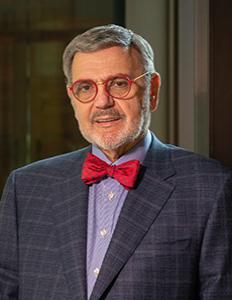Sacred Heart University President weighs in on value of balanced education
University presidents from across the country gathered online for a round table discussion with journalists on the night of April 25. They spoke about some of the most pressing issues facing institutions of higher learning in an era where both technological developments and a shifting political landscape threaten to radically change both the perceived goals and value of a college degree.
John Petillo, president of Sacred Heart University in Fairfield was among the academic leaders who shared their views during the meeting, with an emphasis on strategic matters. Although student encampments demanding colleges and universities disclose and divest from Israel and arms manufacturers had already sprung up across the country, the issue had not yet come to a head with police mobilizations and mass arrests of students as occurred on the night of April 30.

Chris Lynne, the president of the University of Phoenix led the conversation and began by discussing the disruptive potential of generative artificial intelligence, which is what is typically meant by mentions of “AI.”
“Arguably the most noticeable change in both the workforce and higher education has been the onset of generative AI,” Lynne said in order to prompt conversation. “In fact, McKinsey Global updated its projections with generative AI, predicting that 30 percent of the workforce is likely to be displaced by 2030 due to automation or AI.”
Lynne noted that low-income students, who make up a large portion of his university’s enrollment, could be particularly hard hit. He said that the McKinsey study indicated that low wage workers could face an impact up to 14 times higher than average. He used these facts to seek insight from the gathered presidents and educational leaders about what impact they foresee on the perceived value of education from trends in AI and employment.
Petillo pushed back on the idea that the value of a degree is always measurable, though he allowed as a representative of a private institution he doesn’t need to make the case to politicians.
“I just want to make sure we don’t fall into what the press always likes to ask, ‘is it worth it?’ In terms of the skill,” Petillo said. “Because I think we do need to still consider the ability to think critically, to analyze, to appreciate context.”
“I get concerned that we’re just becoming technical schools,” Petillo added. “I think we have to be more encompassing and place everything in context.”
“Hatred doesn’t have a context,” Petillo said by way of example, “but we need to understand what the origins of hatred are and how they have changed over the centuries.”
The issue of balancing the need for material returns on a significant financial investment such as a degree and the mission of academia to produce not just trained workers but an educated populace that can think and consider complex problems was at the core of much of the discussion.
Asked directly how to balance those elements Petillo said that it often comes down to partnerships.
“It’s a partnership with corporations that come to us and say: ‘Well, it’s nice that they know how to be nurses, they know how to be physical therapists, they know how to be accountants, but I’m not sure that they know how to think well,’” Petillo said. “We need to let [students] show us that they can be analytical in their approach and place it in context.”
Petillo noted that many students at Sacred Heart engage in a surprising amount of community service, often dedicated to assisting residents of inner-city Bridgeport. This helps them display to potential employers both their passion and their ability to use the reasoning they’ve learned at Sacred Heart in real world situations.
David Wu, president of Baruch College of the City University of New York agreed with Petillo about the importance of producing not just well trained but well-rounded individuals.
“We do this very intentionally,” Wu explained. “The first two years our students, business major or otherwise spend almost the entire time of their curriculum on science and the liberal arts education. In our view this is critical for their critical thinking skills and frankly business is in many ways a social science. You have to learn how to interact in the social sense and develop the understanding and historic context of a broader knowledge base.”
Wu added that Baruch students are strongly encouraged to visit the many museums of New York City and take advantage of the discounts offered by their student IDs, and that many of his school’s students are pursuing business courses in support of another passion.
“Some of the best theater students are also business students because that’s a tremendous skill for them, to learn how to do a theater production and at the same time become a marketing major. These are very complementary skills,” said Wu.
Petillo also expressed support for the expansion of learning and support outside the traditional classroom, and that there is a role for a university to play even after graduation and to provide lifelong learning.
“We are starting an ‘encore’ program for those who are close to retirement that want to get involved with continuing learning again in the liberal arts, and also be a model for our students. It’s much more than just sitting in the classroom.”
“The continuing use of career services is very important,” Petillo said. “We’ve seen a rapid growth in certificates that can be helpful. And, to get back to partnerships, getting alumni to not just make donations but also to help with paid internships and placement in careers. It’s an ongoing process.”